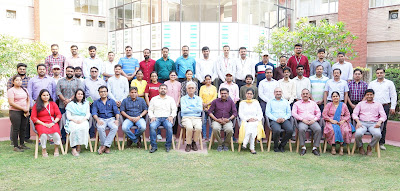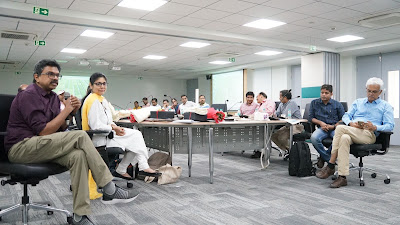Delegates from Water Resources Group (WRG) of the World Bank visited the IRRI South Asia Regional Centre (IRRI SARC) in Varanasi on 8th April 2022 to discuss possible collaboration in the AgWater Project and other initiatives in the Indian State of Uttar Pradesh (U.P.).
The visiting delegation emphasized possible collaboration between the International Rice Research Institute and the World Bank, with the goal to harness potential synergies between the two organizations. They also aim to promote farmers’ prosperity, as well as reduce the agricultural water footprints and emissions.
Dr. Sudhanshu Singh, Director, IRRI SARC briefed the delegates on the current and future research priorities of the center. He introduced them to its units comprised of the Centre for Excellence in Rice Value Addition (CERVA), Centre of Excellence in Sustainable Agriculture (CESA), and Centre of Education, Innovation and Research for Development (CEIRD). To further emphasize the role of these units, he walked them through critical issues impacting the growth and development of R&D activities in the rice sector across South Asia as well as R4D activities being undertaken by IRRI to address them.
A session on presentations from both teams followed with Dr. Virender Kumar, IRRI’s Deputy Platform Lead - Sustainable Impact in Rice-based Systems, Coordinator – DSRC, and Research Leader - Climate-Adaptive Agronomy & Mechanization, shedding light on DSR, DSRC consortium and its themes, and advancements made in DSR with respect to research and development along with the strategy being followed to effect an increase in farmers’ income, enhance water use efficiency and reduce impact on the environment, while IRRI’s Agricultural Economist, Impact Evaluation, Foresight and Policy, Sustainable Impact, Dr. Prakashan Chellattan Veettil, presented the scaling aspects of DSR in India in terms of targeting geographies using remote sensing approaches, developing DSR suitable varieties and seed delivery, micro-irrigation approaches, mechanization, and soil intelligence system.
The discussion progressed with Dr. Ajith Radhakrishnan, India Country Coordinator, 2030 WRG, The World Bank, explaining the Uttar Pradesh AgWater project, along with the expected outcome of increasing farmers’ income, reducing water footprints and agricultural emissions, and details of identified crops - Rice, Sugarcane and Potato.
An engaging discussion on the significance of scaling out DSR in the State of UP to promote water use efficiency, reduce agricultural emissions, and increase farmers’ income ensued. The possibility of securing additional climate finance from actors, including the private sector and other development organizations was also deliberated upon.
The World Bank delegates expressed their interest in collaborating with ISARC beyond the AgWater project under new initiatives being undertaken in the regions of UP and Bihar. Together with IRRI, WRG plans to pursue efforts to identify and prioritize DSR- conducive areas in Eastern UP with a view to channel private sector investments in DSR and converge joint outreach efforts that can push the DSR agenda further up on the Uttar Pradesh administration agenda to impact farming in UP. To regularly monitor progress, the teams plan to organize follow up discussions on the proposed plan of action, financing aspects, as well as other key issues going forward.
The meeting is considered a big step as IRRI and World Bank further strengthen their collaboration to achieve the common goals of enhancing farmers’ incomes and building a resource and climate secure agriculture sector.
###



No comments:
Post a Comment